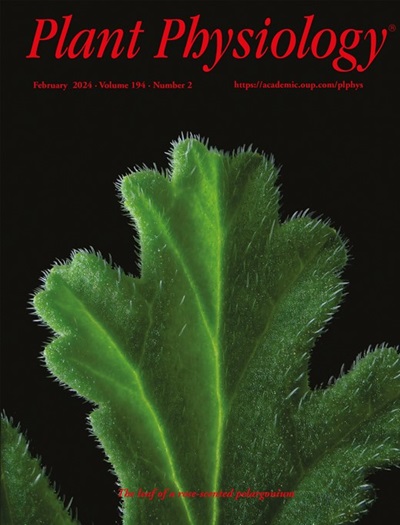Regulation of abscisic acid receptor mRNA stability: involvement of microRNA5628 in PYL6 transcript decay
IF 6.5
1区 生物学
Q1 PLANT SCIENCES
引用次数: 0
Abstract
Phytohormone signaling is fine-tuned by regulatory feedback loops. The phytohormone abscisic acid (ABA) plays key roles in plant development and abiotic stress tolerance. PYRABACTIN RESISTENCE 1/PYR1-LIKE/REGULATORY COMPONENT OF ABA RECEPTOR (PYR/PYL/RCAR) receptors sense ABA, and in turn, ABA represses their expression. Conversely, ABA induces expression of type 2C PROTEIN PHOSPHATASES (PP2C) genes, which negatively regulate the ABA signaling pathway. This regulatory feedback scheme is likely important for modulating ABA signaling. Here, we provide insight into the mechanisms underlying the ABA-induced repression of PYR/PYL/RCAR expression in Arabidopsis (Arabidopsis thaliana). ABA time course analyses revealed strong and sustained repression of PYR/PYL/RCARs, suggesting that receptor gene regulation is an important step in resetting the ABA signaling pathway. Cordycepin-induced transcription inhibition showed that PYL1/4/5/6 mRNA destabilization is involved in the ABA-induced repression of these genes. Furthermore, genetic evidence indicated that decapping may play a role in PYL4/5/6 mRNA decay. We also provide evidence that the Arabidopsis-specific microRNA5628 (miR5628), which is transiently induced by the ABA core signaling pathway, guides PYL6 transcript cleavage in response to ABA. After cleavage, the resulting 5’- and 3’-cleaved fragments of PYL6 mRNA may be degraded by the XRN4 exoribonuclease. miR5628 is an evolutionary novelty that may enhance PYL6 mRNA degradation, along with decapping and XRN4 activity. Thus, regulating the stability of PYR/PYL/RCAR transcripts maintains ABA signaling homeostasis.脱落酸受体mRNA稳定性的调控:microRNA5628参与PYL6转录物衰变
植物激素信号通过调节反馈回路进行微调。植物激素脱落酸(ABA)在植物发育和抗非生物胁迫中起着关键作用。PYRABACTIN resistance 1/PYR1-LIKE/ ABA RECEPTOR REGULATORY COMPONENT OF ABA RECEPTOR (PYR/PYL/RCAR)受体感知ABA, ABA反过来抑制其表达。相反,ABA诱导2C型蛋白磷酸酶(PP2C)基因的表达,负向调控ABA信号通路。这种调节反馈方案可能对ABA信号的调节很重要。在这里,我们深入研究了aba诱导的拟南芥中PYR/PYL/RCAR表达抑制的机制。ABA时间过程分析显示,PYR/PYL/RCARs受到强烈且持续的抑制,表明受体基因调控是ABA信号通路重置的重要步骤。虫草素诱导的转录抑制表明,PYL1/4/5/6 mRNA的不稳定参与了aba诱导的这些基因的抑制。此外,遗传证据表明,脱帽可能在PYL4/5/6 mRNA的衰变中起作用。我们还提供证据表明,ABA核心信号通路瞬时诱导的拟南芥特异性microRNA5628 (miR5628)在ABA的作用下指导PYL6转录物的切割。切割后,得到的PYL6 mRNA的5 ‘和3 ’切割片段可能被XRN4外核糖核酸酶降解。miR5628是一个进化上的新发现,可能会增强PYL6 mRNA的降解,以及脱帽和XRN4的活性。因此,调节PYR/PYL/RCAR转录本的稳定性可以维持ABA信号的稳态。
本文章由计算机程序翻译,如有差异,请以英文原文为准。
求助全文
约1分钟内获得全文
求助全文
来源期刊

Plant Physiology
生物-植物科学
CiteScore
12.20
自引率
5.40%
发文量
535
审稿时长
2.3 months
期刊介绍:
Plant Physiology® is a distinguished and highly respected journal with a rich history dating back to its establishment in 1926. It stands as a leading international publication in the field of plant biology, covering a comprehensive range of topics from the molecular and structural aspects of plant life to systems biology and ecophysiology. Recognized as the most highly cited journal in plant sciences, Plant Physiology® is a testament to its commitment to excellence and the dissemination of groundbreaking research.
As the official publication of the American Society of Plant Biologists, Plant Physiology® upholds rigorous peer-review standards, ensuring that the scientific community receives the highest quality research. The journal releases 12 issues annually, providing a steady stream of new findings and insights to its readership.
 求助内容:
求助内容: 应助结果提醒方式:
应助结果提醒方式:


